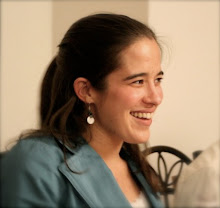I was warned before coming here that I would get a lot of attention as a white, Western female in India. I suppose I get some attention (i.e. staring), although it's mostly from small children, but it's certainly not what I expected after a total of ~8 past months in Latin America. When adults here do look at me, they only watch until I am past and never (that I've noticed) turn their heads. I also have not gotten any sound effects like the ones I encountered in Costa Rica and Honduras ("Ch-ch-ch," "Good morning, beautiful," "Hello, how are you?," whistling, etc.).
I have mixed reactions to this. It reminds me of my twin's reaction after her return from a semester in Costa Rica where she got lots of attention for simply walking down the street: "Don't I look nice today or something?" While I remember feeling fed up with the attention at times (can't I just get to my destination without attracting added attention that takes emotional energy even to ignore?), it is still a bit unexpected not to get attention like that at all.
The situation has also reminded me of other times/places in my life where I want attention and am ignored (e.g. the OR almost any time) or get attention I don't want (e.g. an attending's questions regarding a subject about which I remember little). This was especially true last week when I felt fairly ignored by my team at the hospital. It reminds me of how much I can come to depend on others' attention and affirmation for my worth. It also reminds me of how the way I acknowledge or ignore others matters, both in what it communicates to them about their worth and in what the reactions it forms in me. Do I really believe all other human beings I encounter are equally valuable because they are made in the image of God? Or am I happier to encounter a western-looking one or one who speaks English or one who is kind to me or smiles back at me?
The idea of facing someone reminds me of something I thought about a bit my senior year in college, partly due to help in conversations from an art major on my floor. We talked about how part of art is the act of "beholding" the other, accepting who/what they are in order to portray it. I remember thinking at that time about how part of my service in medicine can be a similar act of beholding a patient's illness/pain and not turn away. I can choose not to be disgusted or discouraged, not to be overwhelmed by their suffering, but to offer the accompaniment of my presence and beholding in the midst of it. I think God offers us a similar accompaniment, and one of my favorite portrayals of God's attention to us is the Old Testament idea of God's turning his face toward us, letting the light of his face shine upon us. It is encouraging to me when I see clearly my own quick frustrations or impatience or self-absorption to remember that God is not surprised or disgusted by my sin but continues to turn his face towards me. That is attention that matters.
Subscribe to:
Post Comments (Atom)


This is my observation from my physical therapy in the US. Very few people actually listen to me. They are too busy having fun exploring "what is wrong with me" and how can they fix it with their knowledge? I simply want relief from the pain. I think that after having a bad back for ten years, I am fairly knowledgeable about my body and how to fix it. I can even tell them directly what to do, and they will say, "Oh, try this instead." They aren't respecting me as a person, but rather seem me as a body to be fixed. And then, to add insult to injury, I get to pay them for being ineffective.
ReplyDeleteI think you have got it, when you say that we really want is loving attentiveness, and to fully human.
Great reflections on our role as physicians, especially physicians who view the profession as a calling from God. The further in medicine I get, the more I realize that technical expertise is a much smaller component of being a good doctor than is your presence and attentive ear to listen to a story. Keep thinking and writing!
ReplyDelete